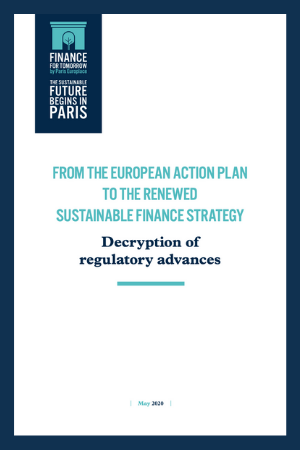From the European Action Plan to the renewed strategy on sustainable finance
Decrypting regulatory advances
Sustainable finance has now reached a central status in the European policy agenda. This was achieved notably thanks to the work initiated by the High-Level Expert Group (HLEG) on sustainable finance, mandated by the European Commission at the end of 2016, and followed by the Technical Expert Group (TEG). Since 2018, an Action Plan is under implementation based on the initial recommendations of the HLEG. It aims to define a global strategy to make sustainable finance the framework of the European financial system, in order to build a low-carbon and inclusive economy, in adequation with the challenges of our time.
The momentum now carried by the “Green Deal”, for the carbon neutrality of the European continent by 2050, is unprecedented. Accompanied by a massive investment plan estimated at 1000bn euros from public and private sources, it sets the ecological transition at the forefront of the growth strategy in Europe for the next decade. In this context, the European Commission is currently defining its “Renewed Sustainable Finance Strategy” with a public consultation open until July 2020. It aims to strengthen, develop, and accelerate the action plan, aiming to mobilize all the financial capital necessary for the ecological transition. In March 2020, the proposal for a taxonomy of sustainable economic activities by the European Technical Expert Group was an essential step. This taxonomy will have to define a common language, which will constitute a major lever to pursue tangible objectives for the transformation of the economy and the financial system. It is considered to be the basis for the development of the overall ten strategic axis of the plan.
With its members, Finance for Tomorrow will contribute to improve the formulated proposals, to support their impact and ambition, and to secure that they can be effectively implemented, everywhere in the world. The working group “Impact of the Green Deal and Taxonomy” is coordinating a substantial response to those rich texts proposals, to ensure that they are effective in the short and medium term, and allow for the full achievement of the Paris Agreement and the UN Sustainable Development Goals over the long-term.
Produced by our “Commission Policy”, this decryption has vocation to present an overview of the regulatory advances of the Action Plan in order to enable economic and financial actors to take ownership and participate to their improvement in the forthcoming months. It explains the implementation of the first legislative proposals from 2018, presents the ongoing development of norms and standards, and introduces the work of the financial supervision authorities in view of the next steps to come. The aim is, on the one hand, to foster the capacity of stakeholders to anticipate the implementation of new processes and, on the other hand, to encourage their mobilization in the context of the ongoing work of the European Commission and its public consultations, and the work carried out by Finance for tomorrow and its members to make a constructive contribution.
Given the environmental emergency, and the health crisis facing us, the opportunities provided by sustainable finance are more and more essential every day. The transition towards a more sustainable and resilient economy must be a cornerstone of our economic recovery post-COVID 19. For this, it is fundamental to provide political and regulatory tools to financial actors, in order to guarantee their genuine support of the companies’ transition towards sustainability. It is a key element of the Roadmap to Recovery of the European Council, as well as the message conveyed by the members of the technical expert group on sustainable finance. This objective should be based on the work undertaken by the most mobilized institutions, in France as in Europe. It is also the ambition that Finance for Tomorrow will continue to carry.

